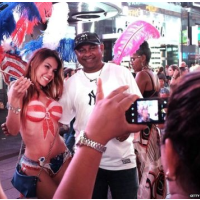Aggressive Superheroes and Painted Topless Women Banished to Times Square Phantom Zones
 (photo: Getty Images)
(photo: Getty Images)
By Emma G. Fitzsimmons, New York Times
NEW YORK — After a furor last summer over topless women and menacing superheroes, New York City is moving to rein in the performers who hustle for tips in Times Square.
The City Council voted Thursday to allow the city’s Transportation Department to create new rules for pedestrian plazas that could restrict Times Square’s costumed characters and painted women to designated zones. The changes could drastically reshape the atmosphere at the city’s iconic tourist destination.
The transportation commissioner, Polly Trottenberg, has proposed creating “activity zones” for commercial pursuits and separate “flow zones” for pedestrians. Elmo and Batman would have to stay within the commercial zones to take photos with tourists in exchange for tips.
City officials said the rules were aimed at restoring order to the gleaming Disneyfied plazas that have transformed the seedy Times Square of the 1980s. The concerns over aggressive tip seekers became a prominent issue last summer when topless women wearing body paint, known as desnudas, joined the fray.
In a high-profile arrest in 2014, a man dressed as Spider-Man punched an officer in the face. Other characters have been caught in other scuffles or accused of using explicit language.
Times Square has been a victim of its own success, said Councilman Corey Johnson, a sponsor of the council bill. Performers should be able to make an “honest buck” in the plazas, he said, but some tip-seekers go too far. “People should be able to walk through Times Square without being harassed and harangued,” Johnson, a Democrat, said.
After the issue erupted last summer, Mayor Bill de Blasio said he would consider removing the plazas, prompting criticism from transportation groups who said the plazas had improved traffic safety. Police Commissioner William J. Bratton suggested he wanted to “dig the whole damn thing up.” Gov. Andrew M. Cuomo was not far behind, saying the topless women undermined the family-friendly nature of the square the city wanted to promote.
On Thursday, several performers in superhero costumes came to the council chambers to defend their profession. Abdel Amine Elkhezzani, 37, a Spider-Man performer in Times Square, said he would lose most of his business if he had to stay in a certain zone.
“We go up to people and interact with them and entertain them and kind of convince them to take pictures with us,” said Elkhezzani, who is a different performer from the man who was arrested. “They don’t come up to us — maybe 5 percent come up to us.”
The bill passed 42-1, with five council members abstaining. It lets the Transportation Department regulate city plazas and to create specific rules for Times Square. De Blasio is expected to sign the bill.
“Times Square is one of the most iconic and visited places in the city, and the council’s legislation goes a long way toward making the experience better and more enjoyable for New Yorkers and tourists alike,” Austin Finan, a spokesman for the mayor, said in a statement.
After the Transportation Department formally proposes the rules, there would be a 30-day period for the public to comment. The rules could take effect in May or June.
The city’s proposal for the activity zones in Times Square mirrors recommendations in September from a coalition of elected officials and business leaders. On Thursday, the Times Square Alliance applauded the passage of the bill.
Legal experts were divided over whether any new rules could withstand a challenge over free speech. Norman Siegel, a civil rights lawyer, said the city was inviting a lawsuit because the rules could place limits on where topless performers could stand and exercise their First Amendment rights. Siegel said he believed the courts would eventually weigh in on the matter. “In a quintessential public space, can the city argue that you can only be limited to a specific section?” he said.
“Eventually, I think the courts will answer the question of whether or not — in a quintessential public space — can the city argue that you can only be limited to a specific section?” Siegel said.
Eugene Volokh, a First Amendment expert at UCLA School of Law, said the city’s rules did not appear to be unconstitutional.
“So long as they’re targeting the activity because of it’s commercial nature, rather than its message, I think it should be fine,” Volokh said.
In an interview, Trottenberg said the city was sensitive to ensuring people’s First Amendment rights. She compared the plaza rules to how the city’s parks department regulates those spaces.
“They have traditionally had a pretty strong ability to determine where vending occurs and where performances occur,” she said.
At City Hall, Elkhezzani wore his Spider-Man costume but said he was not allowed to wear his mask in the building. He said he would sue the city if the police tried to arrest him under the proposed new rules, citing free-speech concerns.
“I have a right to walk in a public space in my Spider-Man costume,” he said. “If somebody wants to take pictures with me, that’s their right.”
To Learn More:
New York City Police Officers Reminded to Allow Women to Bare their Breasts in Public (by Noel Brinkerhoff, AllGov)
- Top Stories
- Unusual News
- Where is the Money Going?
- Controversies
- U.S. and the World
- Appointments and Resignations
- Latest News
- Trump Orders ICE and Border Patrol to Kill More Protestors
- Trump Renames National Football League National Trump League
- Trump to Stop Deportations If…
- Trump Denounces World Series
- What If China Invaded the United States?






Comments